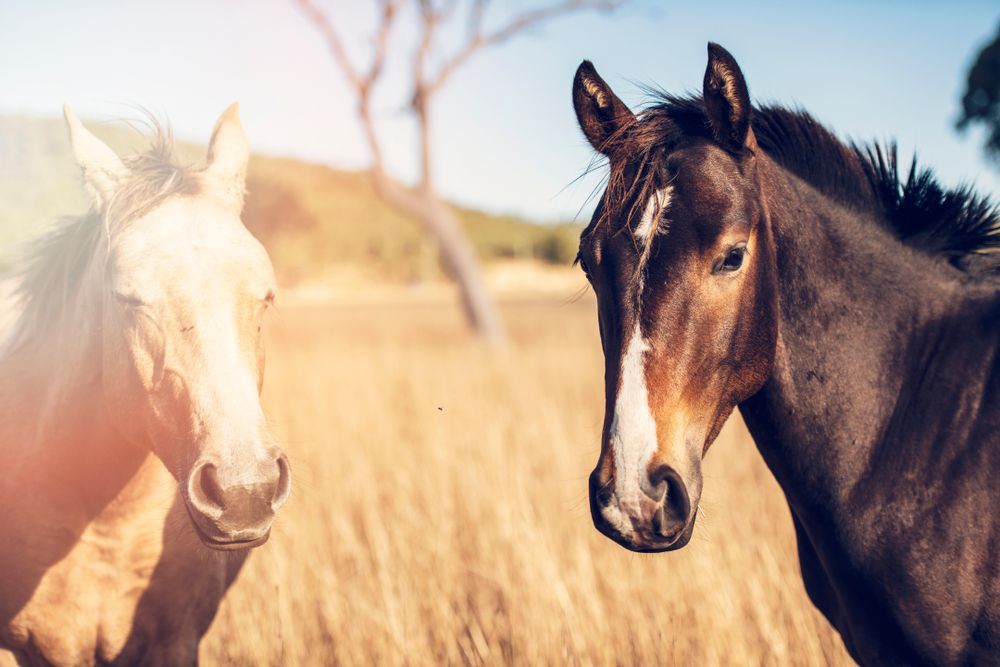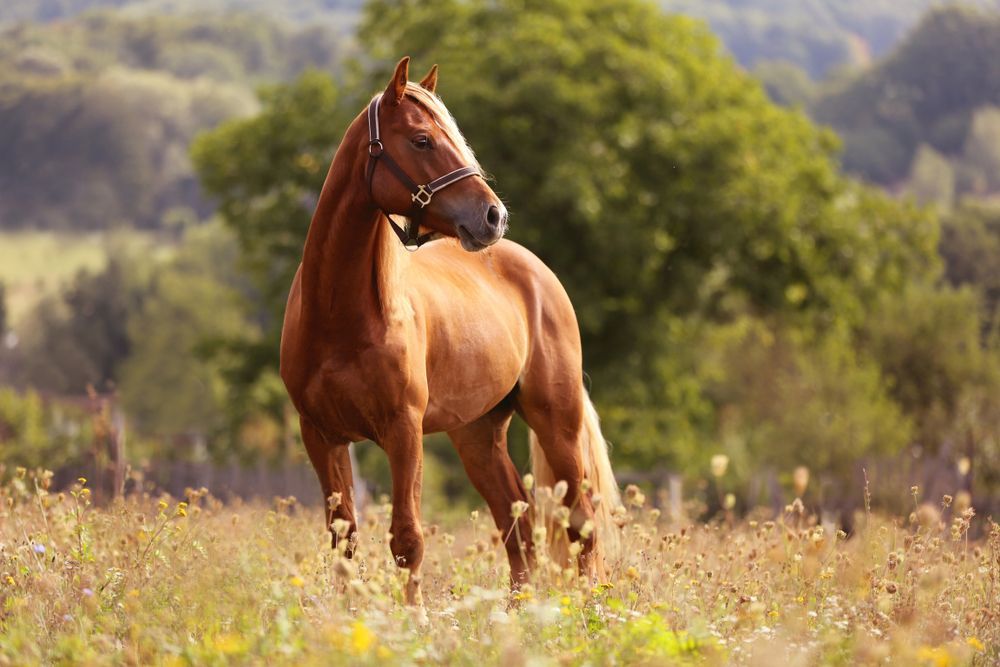Anxiety in horses
One of the most common conversations I have with horse owners is about anxiety! Horses are incredibly sensitive creatures and many of them suffer anxiety at some point in their lives. It is very distressing for us to watch our beautiful partners suffering, but it helps us to understand what might be behind our horse’s anxiety.
If we understand what has caused our horse to be anxious, there are often relatively easy and practical steps we can take to reduce the anxiety and to prevent further episodes in the future.
What are the symptoms of anxiety?
Generally, anxiety will show through in behavioural issues, changes in temperament or moodiness, and body language. Common signals your horse may use to communicate it is feeling anxious are
- bucking or rearing,
- wild tossing of the head,
- rolling its eyes
- repetitive pawing of the ground
- pacing
- calling
- sweating
- trembling
- unwillingness to eat.
Your horse may also repeat self-soothing behaviours, such as scratching against a fence post, until they have a bald patch or are bleeding. At its worst, anxiety may cause your horse to hurt itself, either deliberately or accidentally, or hurt other horses or humans in its space.
Symptoms may be ongoing, or you may notice your horse becomes very anxious in certain situations or in response to particular events or triggers.
Some triggers are easy to spot – for example, a horse that has had a bad experience while being transported (whether experiencing a rough ride or being transported from a home they loved to a new environment, for example) may become anxious every time they are directed to board a float or truck. Other triggers may be much more difficult to uncover. For example, a rescue horse may become very anxious whenever it sees a newspaper if it has had a rolled paper used to beat it – it may take you a while to find the “common factor” for what triggers its anxious behaviour.
What causes anxiety in horses?
Just as in humans, anxiety in horses can be caused by many things
Separation Anxiety
Horses may become anxious due to separation from –
- Their herd
- Other horse friends
- Other companion animals (a cat or dog, for example)
- Particular humans – owner, regular rider or regular visitors
Separation anxiety can be present even when the separation is only short-term. For example, your horse may be anxious when you leave for work each day. At other times, the separation anxiety may be based on a permanent separation.
Routine and clear communication can help to soothe separation anxiety. Leaving and returning at the same time each day and letting your horse know when you are home can be helpful.
Providing alternative company may also help. This could be a companion animal or regular visits from a neighbour.
You may need to experiment to find what specific actions help your horse to feel less anxious about being separated. Harmonising treatments, such as my program, can help to heal the feeling of separation too. Sometimes assisting your horse to “down regulate” – that is, achieve inner calm and peace – is necessary before implementing any changes to routine or their home environment. Once calm, your horse may be much more receptive to your attempts to help it address its separation anxiety.
Performance Anxiety
Horses involved in events, such as dressage or racing, can become anxious prior to performing. This might be picked up from their owner or rider who may also be anxious about doing well but it may also be the noises, smells and sights associated with an event has become associated with anxiety and becomes triggering.
In addition, it is likely your horse’s usual routine is disrupted on event days. There may be a combination of stressful events for your horse to handle in relation to an event – being transported, staying in a strange environment, contact with unfamiliar horses and people, change in food or routine, etc It could simply be the combined impact of these various stresses causing event-related stress that appears as performance anxiety.
Grief
Just as humans grieve following the loss of a loved one, through death or permanent separation, so do to horses. And much like humans, they may sometimes need some help to get through the grieving process.
Just as you would offer comfort to a friend or family member who is grieving, your horse can benefit from the same comforting attention. Regular hugging, patting, stroking, grooming, and talking with your horse, particularly at times when it seems agitated or sad, can help it to process its emotions. Providing energy healing treatments is also very beneficial, helping to shift any energy that is stuck or blocked, letting your horse move past its more intense emotions.
Trauma
Horses may experience trauma as a result of an accident, a scare, abuse or other events that trigger a fight/flight/freeze response in them. As with humans, trauma can occur long before the symptoms show up and it can just as easily be a “near miss” as an actual event that triggers the experience of trauma. As such, it is possible you will not even be aware of the event that caused your horse to develop symptoms.
Understanding the cause is not always necessary – if your horse is showing signs of anxiety, concentrating on calming through touch, talk and careful consideration of its environment can still work.
Situational anxiety
Some horses may associate a particular situation with a bad experience they’ve had. As mentioned previously, for example, a horse that has had a bad experience being transported may show signs of anxiety every time you try to get it into the float or truck.
Situational anxiety can be overcome by providing repeated positive experiences of the situations your horse is triggered by. This needs to be done very slowly and carefully, in a very trusted manner. If this work is not undertaken with extreme care, it can cause the anxiety to get worse.
Change anxiety
Abrupt changes to a horse’s living conditions – its location, the animals and humans it is accustomed to, or a significant change in routine – may trigger anxiety for your horse. Just as some humans deal better with change, so do some horses. This can be simply a matter of personality or how much change they’ve experienced in their lives – and whether or not their experience with change has been mostly positive.
Inconsistency, or regular changes to instructions and communications with your horse – either from the same rider or due to altering riders, can cause change anxiety too. Imagine if the same word meant different things on different days and you were expected to remember this change!
What is the impact of anxiety in horses?
Anxiety does not just make your horse difficult to handle, it can lead to several health problems. If your horse is not eating because of its anxiety, this may lead to malnutrition – especially as your horse will usually burn up calories more quickly while it is anxious. Anxiety may also impact digestion, causing colic or impactions.
Anxious horses can damage their hooves or cause injuries to themselves through repeated or careless movements.
How can anxiety in a horse be treated?
The exact treatment will vary depending on the cause of the anxiety and the personality of the horse. Some of the things that can help are:
- Soothing and emotional reassurance – your words and touch mean a lot to your horse!
- Energy healing – release old traumas and sooth your horse energetically.
- Routine – a consistent routine can be very calming.
- Minimise change – from the big changes to small day to day alterations to their environment, riders, food, etc it is best to minimise change for an anxious horse at least until they’re calmed.
- Learn to communicate holistically – ensure your non-verbal and verbal cues to your horse are consistent.
- Check your tack – sometimes uncomfortable or painful tack can be stressing your horse.
- Groundwork – developing a relationship of trusted teamwork with your horse can help you overcome scary situations together.
- Regular exercise – your horse needs to release its pent up energy so regular exercise, or increased time in the paddock, can be helpful.
- Companionship – your horse may need other horses or animals around to feel safe and connected.
- Supplementation – there are a number of effective calming supplements on the market. Change of diet may also be useful.
Most importantly, do not ignore anxiety in your horse, hoping it will pass or your horse will “just get over it”. While some horses are more highly strung by nature, it is not natural for a horse to be in a state of high anxiety on a regular basis. Taking the time to connect with your horse, build trust and offer comfort, may be all that is needed to begin to bring some calm to it. You may also find that working with a professional trainer or healer is helpful. Often a rider or owner becomes anxious when their horse is anxious and it becomes too difficult for them to be responsible for calming the animal. This is completely natural! A trained professional can not only help your horse to feel calm but also to help you feel calm with your horse. This can save both of you a lot of suffering!
The great news is that it is almost always possible to reduce your horse’s anxiety through the simple suggestions made above. It may take some time to see results but you may also be very pleasantly surprised at how quickly your horse responds to your efforts.


Trading Hours
Monday 24/7 by appointment
Tuesday 24/7 by appointment
Wednesday 24/7 by appointment
Thursday 24/7 by appointment
Friday 24/7 by appointment
Saturday 24/7 by appointment
Sunday 24/7 by appointment
Monday
Tuesday
Wednesday
Thursday
Friday
Saturday
Sunday
24/7 by appointment
24/7 by appointment
24/7 by appointment
24/7 by appointment
24/7 by appointment
24/7 by appointment
24/7 by appointment
Contact Us
Licenses
ABN: 12567910271
Member of the IICT (International Institute for Complementary Therapists)
Fully Insured





